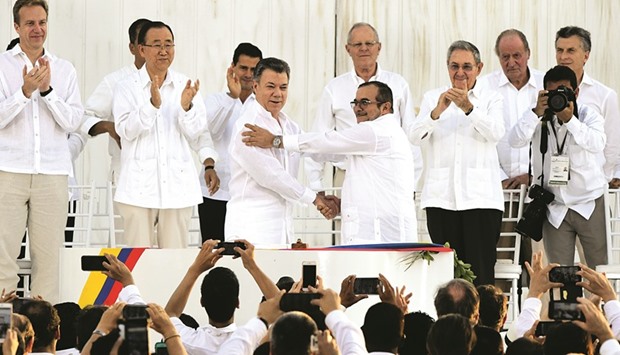Deadlock will return if the deal fails to be ratified in a referendum on October 2, Humberto de la Calle said after Monday’s historic ceremony.
“Voting ‘No’ and thinking that we can correct whatever we want (in the accord) is an illusion. This is the best accord possible,” he said in an interview.
“The peace process is over. I do not share the view that we can start negotiating again if the ‘No’ vote wins,” he said. “This is our opportunity. History shows that after a rupture, the sides return to their initial, more radical positions.”
De la Calle, 70, led the government delegation at four years of peace talks in Havana with negotiators from the Revolutionary Armed Forces of Colombia (Farc). The process led to a peace accord that was agreed last month and signed on Monday by President Juan Manuel Santos and Farc leader Timoleon “Timochenko” Jimenez.
The Farc’s 7,000 fighters must now come out of their jungle camps and disarm. The force will transform into a political group.
The repeated flights between the Cuban capital and Colombia left De la Calle with a hearing problem. He says he stuck through it thinking “permanently” of a peaceful future for his grandchildren.
“My earliest memories are of being surrounded by violence,” he said, recalling the long decades of civil strife in the South American country that erupted into civil war in 1964.
Colombian authorities estimate the territorial and ideological conflict has killed 260,000 people, left 45,000 missing and uprooted 6.9mn.
“My generation has seen years wasted. It is not mere rhetoric to say that we want a better country for the children.”
Two opinion surveys by pollsters Datexco and Ipsos Napoleon Franco, published on Monday, indicated the ‘Yes” vote will win in Sunday’s referendum by a strong margin of around 20%.
The ‘No’ vote in each case was about 35%.
Many Colombians resent making concessions to a group they see as terrorists, that has carried out countless kidnappings and attacks.
De la Calle bore the weight of those feelings during the negotiations. “In the evenings I exercised in front of the mirror. I slapped myself in the face and said: ‘Don’t forget what this is about and who you are talking to,” he said.
“I hold completely different ideas to theirs and we will continue to be adversaries in political life,” he said of the Farc. But in the negotiations, he said, “I managed to understand the Farc better, and I understood Colombia better too.”
He judges that the peace accord offers a “balanced” answer to the question of justice for atrocities committed during the conflict.
A special independent court will be set up to try suspects from all sides in the conflict and will sentence convicts to jail. Over the decades the conflict drew in various left- and right-wing armed groups and drug gangs as well as state forces.
Those who reject the court will get up to 20 years in jail if convicted, de la Calle said.
Those who confess their crimes and compensate victims will get “alternative sentences.”
The court will rule on whether convicts can then hold political office. “Our wish is for the greatest political involvement possible by the Farc,” the negotiator said.
“Peace does not come about by a miracle. We all have to make an effort — a material one, but also a spiritual one, to change our attitude,” he said.
“What comes next is a bigger challenge.”
Colombian President Juan Manuel Santos and the head of the Farc, Timoleon Jimenez, aka Timochenko, shake hands during the signing of the historic peace agreement between the Colombian government and the Revolutionary Armed Forces of Colombia in Cartagena, Colombia.

